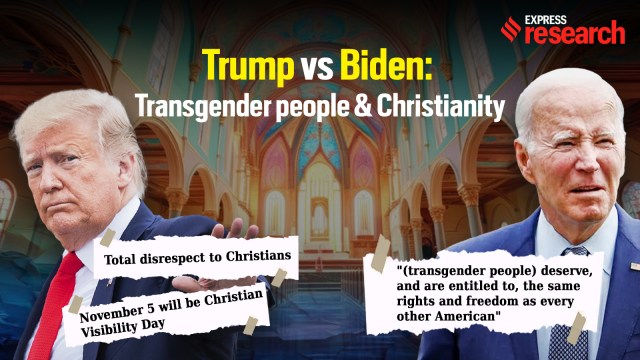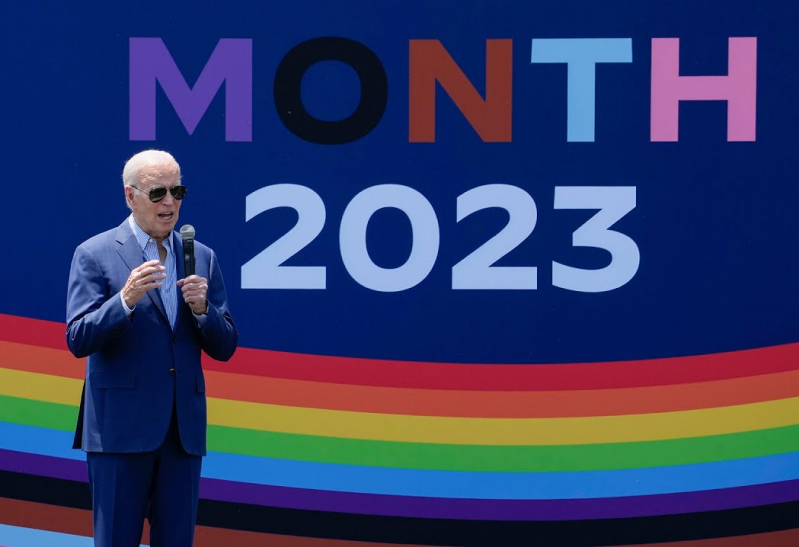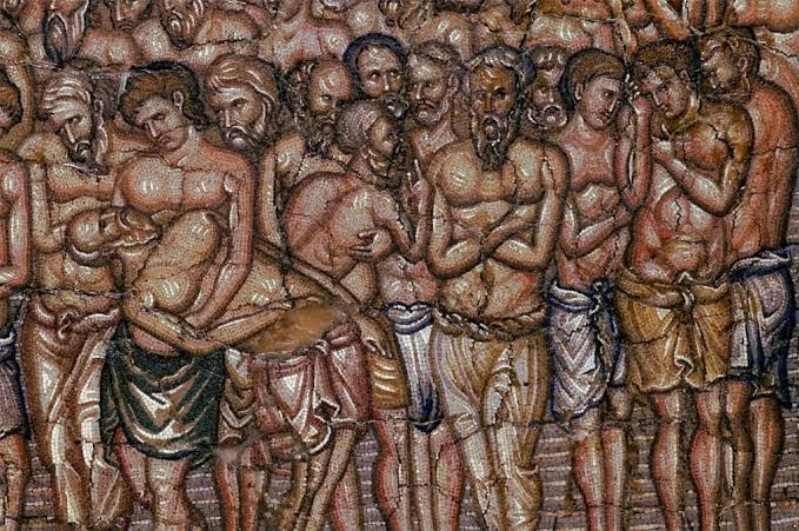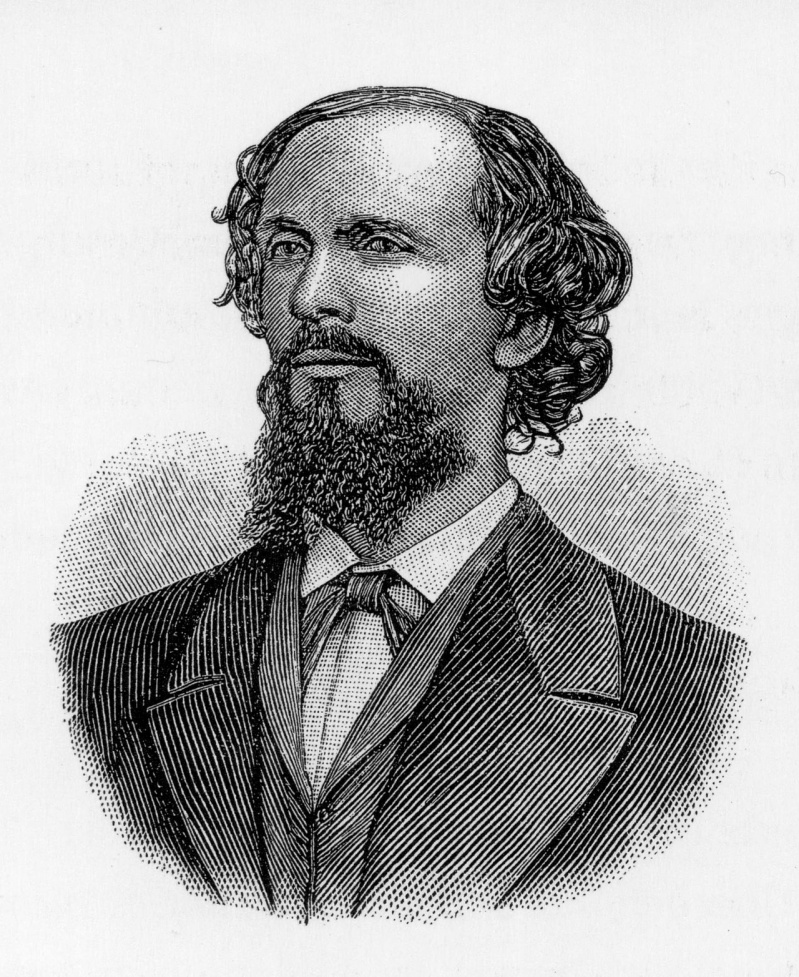The complex journey of transgender rights in Christianity
From the hallowed halls of ancient philosophy to the bustling thoroughfares of medieval Europe, the journey of transgender rights within Christianity paints a complex picture, interwoven with threads of mythology, religion, and cultural evolution.
 Trump and Biden got into a heated row over transgender rights
Trump and Biden got into a heated row over transgender rightsAt a rally in Wisconsin on April 2, former US president Donald Trump accused President Joe Biden of hurting the sentiments of millions of Christians by recognising the Transgender Day of Visibility which, this year, happens to fall on the same day as Easter Sunday. Trump, while vehemently criticising his opponent, announced plans of celebrating November 5 as Christian Visibility Day.
The incident brings to light the complex relationship between Christianity and the issue of the third gender.
 President Joe Biden at a pride month rally in 2023 (AP News)
President Joe Biden at a pride month rally in 2023 (AP News)
A piece of research conducted by the Reverend Duncan Dormor, Dean of Chapel and Director of Studies for Theology at St John’s College, University of Cambridge in 2015 reveals that a stark divide exists among Christians in the United States regarding the determinants of gender. According to the research, 63 per cent people assert that one’s gender is fixed at birth and rooted in biological sex. On the other hand, an increasing number of Protestant denominations are embracing a more inclusive stance towards transgender individuals, welcoming them not only as congregants but also as ministers. Dormor’s research illuminates this shift, characterising it as “a slow, sometimes grudging, but growing momentum for change among Christians within Protestantism especially.” However, he also observes that “the overwhelming majority of the 2.1 billion Christians in the world belong to Churches which are officially unsympathetic to the claims of transgender people.”
Transgender rights in Christian debates
In the realm of Christian theology, the interpretation of scripture plays a pivotal role in shaping attitudes towards transgender rights and gender identity.
At the heart of this theological discourse lies the question of scriptural authority and its implications for understanding gender identity. While some denominations explicitly support gender transition, citing biblical passages that speak to the inherent dignity and worth of all individuals, others maintain staunch opposition, invoking biblical references to God’s creation of humanity as male and female.
The interpretation of the creation narratives in the book of Genesis underscores the theological debate surrounding transgender rights. The conservative Evangelical perspective, as articulated by American theologian Albert Mohler, emphasises the divine intention behind biological sex. He views the attempt to alter one’s gender as a defiance of God’s design.
On the other hand, there are the progressive evangelical theologians of the likes of David Gushee, who has been a strong activist of LGBTQ rights. Gushee offers an alternative reading of scripture and suggests that gender is not rigidly binary but exists along a continuum of expression.
Early history of the Third Gender in the West
Although the term ‘transgender’ is fairly recent, the pages of early European history are replete with references to eunuchs, cross-dressers, and gender fluid identities. The renowned classical Greek philosopher Plato in his writings as early as 385 BCE refers to a third sex. The fourth century BCE Greek physician Hippocrates too mentioned the existence of cross-dressing individuals. Even amongst proponents of early Christianity, like the philosopher Clement of Alexandria, the body of Christ was said to have transcended the male-female binary.
 Eunuchs held a special place in Byzantine society (Wikimedia Commons)
Eunuchs held a special place in Byzantine society (Wikimedia Commons)
However, with the advent of Christianity in the fourth century CE, the landscape of gender discourse underwent a profound transformation. As Christianity gained prominence, it codified and institutionalised patriarchal assumptions inherited from Roman culture, shaping perceptions of gender for centuries to come. Early Christian theologians of the time like St. Ambrose and St. Jerome perpetuated traditional gender norms, Consequently, eunuchs who had a special place in Byzantine society, were regarded as being morally deficient and unreliable.
Throughout medieval Europe, instances of cross-dressing were met with varying degrees of acceptance and condemnation. While women occasionally donned male attire to pursue unconventional paths, male cross-dressing was often viewed with suspicion and linked to the devil’s influence. However, even among women, those like Joan of Arc, though celebrated for their valour, faced condemnation for their unconventional gender expression. She was accused of blasphemy for wearing men’s clothes during her trial before being executed in 1456.
The emergence of transgender rights in public discourse
In the 19th century, the landscape of gender identity and sexual orientation underwent significant evolution, thanks to the pioneering work of individuals like Karl Heinrich Ulrichs and Magnus Hirschfeld.
In 1867, Ulrichs, a German lawyer and writer, stood before the Association of German Jurists in Munich. Rumours of Ulrichs’ same-sex love affairs had already cost him dearly, stripping him of his legal career and casting him as an outcast in his homeland. But on this day, he refused to be silenced, his voice ringing out amidst the scepticism and derision of his audience.
“Gentlemen, my proposal is directed toward a revision of the current penal law,” he began, his tone unwavering despite the jeers that punctuated his speech.
Historian Robert Beachy, who chronicled Ulrichs’ legacy in his book Gay Berlin: Birthplace of a Modern Identity, reflected on the significance of this moment in history. “I think it is reasonable to describe him as the first gay person to publicly out himself,” Beachy remarked in an interview with the New York Times. “There is nothing comparable in the historical record. There is just nothing else like this out there.”
Ulrichss’ groundbreaking advocacy was underscored by his belief in the innate nature of same-sex attraction, which he viewed as a natural variation of human sexuality rather than a moral failing or psychological disorder. His stance, articulated in speeches and writings throughout the 1860s and 1870s, laid the groundwork for future LGBTQ+ rights movements and contributed to a growing awareness of the diversity of human sexual expression.
 Karl Ulrichs (Wikimedia Commons)
Karl Ulrichs (Wikimedia Commons)
Meanwhile, Magnus Hirschfeld, a German physician and sexologist, further advanced the understanding of transgender identity through his pioneering research and activism. His campaign began at the turn of the 20th century when a distraught soldier, his face etched with anguish, stood trembling on the doorstep of Hirschfeld’s practice. In hushed tones, he confessed his deepest secret: he was an Urning, a term used to describe homosexual men in a society where such desires were condemned. In Germany, the infamous ‘Paragraph 175’ criminalised homosexuality, threatening those accused with the loss of their rank, title, and freedom.
A homosexual himself and a Jew in a society rife with prejudice, Hirschfeld understood all too well the weight of societal expectations and the agony of living in the shadows. But despite his efforts to offer solace, the soldier tragically took his own life.
In the aftermath of this loss, the soldier’s final words echoed hauntingly in Hirschfeld’s mind. Entrusted with the soldier’s private papers and a poignant letter, Hirschfeld was spurred to action. “The thought that you could contribute to [a future] when the German fatherland will think of us in more just terms,” the letter read, “sweetens the hour of death.” It was a call to arms that Hirschfeld could not ignore.
Rejecting prevailing notions of homosexuality as a pathology, he championed the idea of a “third sex,” advocating for the recognition of individuals whose identities transcended binary categories. Through his pioneering work at the Institute for Sexual Research, established in Berlin in 1919, Hirschfeld provided a sanctuary for those marginalised by society, offering groundbreaking treatments and affirming the plurality of gender identity.
Tragically, the vision of the Institute was cut short by the rise of the Nazi regime in Germany under which LGBTQ+ individuals, including transgender people, were targeted for persecution and violence. The institute was shuttered, and Hirschfeld’s research was destroyed in the infamous book burnings of 1933. Many LGBTQ+ individuals fled the country to escape persecution, while others faced imprisonment, forced sterilisation, and even death in concentration camps.
Despite the dark chapter of Nazi oppression, the legacy of Ulrichs and Hirschfeld endured, inspiring future generations of LGBTQ+ activists and scholars.
Transgender rights in contemporary Christian society
In the ever-evolving landscape of religious attitudes toward gender identity, the Catholic Church finds itself navigating complex terrain, influenced by both tradition and contemporary understanding. Inspired by psychoanalysis and studies of sexuality, modern notions of gender and gender identity have challenged traditional understandings of sex and gender within Catholic doctrine.
Professor of religion at Northwestern University Elizabeth M. Bucar in her essay Bodies at the Margins (2010), observes that while the Vatican lacks an official position on sexual reassignment operations, reports suggest a nuanced stance.
For instance, documents circulated to papal representatives and bishops’ conferences in 2000 and 2002 assert that sex change operations are superficial and external, incapable of altering an individual’s inherent sex or gender. This position emphasises the primacy of one’s sex assigned at birth, maintaining traditional gender roles and moral duties.
Similarly, in 2014, the Southern Baptist Convention, the world’s largest Baptist Christian organisation, adopted a resolution affirming that individuals are created within a gender binary of male and female.
In more recent years, the Vatican has demonstrated a willingness to engage with contemporary discourse on transgender rights within the Catholic Church. In a significant step toward inclusion, the Vatican’s doctrinal office announced in 2020 that transgender people, under certain circumstances, can receive baptism and serve as godparents. This decision, approved by Pope Francis, acknowledges the dignity and spiritual identity of transgender individuals within the Church.
However, this move comes with caveats. Baptisms for transgender individuals are permitted only if there is no risk of public scandal or confusion among the faithful. Local priests are entrusted with the discretion to determine whether a transgender person may serve as a godparent, emphasising pastoral prudence and avoiding undue controversy.
While Pope Francis has reiterated the Church’s opposition to same-sex marriage, he has also emphasised the importance of welcoming LGBTQ+ individuals into the Catholic community. His condemnation of laws criminalising homosexuality and calls for greater inclusivity reflect a broader shift toward acceptance and compassion within the Church. As the Catholic Church continues to grapple with evolving understandings of gender and sexuality, these developments signal a nuanced engagement with contemporary issues and a commitment to fostering a more inclusive faith community.
Yet again, these sentiments are opposed by the Vatican’s latest pronouncement released earlier this month and endorsed by Pope Francis. It asserts that gender fluidity, transition surgery, and surrogacy are deemed affronts to human dignity.
The document emphasises the belief that the sex assigned at birth is a divine gift, described as an ‘irrevocable gift’ from God. It cautions against any intervention aimed at changing one’s sex, asserting that such actions jeopardise the inherent dignity bestowed upon individuals from the moment of conception.
This latest pronouncement is likely to find favour among conservatives for its firm stance against liberal notions concerning gender and surrogacy. Meanwhile, for the advocates of LGBTQ rights within the church, this new document is yet another cause for concern of a novel weapon of discrimination in their long struggle to get recognition.
- 01
- 02
- 03
- 04
- 05































